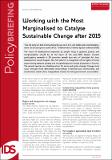| dc.contributor.author | Wheeler, Joanna | |
| dc.contributor.author | Frecheville, Neva | |
| dc.date.accessioned | 2013-09-02T08:21:17Z | |
| dc.date.available | 2013-09-02T08:21:17Z | |
| dc.date.issued | 2013-09-02 | |
| dc.identifier.issn | 1479-974X | |
| dc.identifier.uri | https://opendocs.ids.ac.uk/opendocs/handle/20.500.12413/2944 | |
| dc.description.abstract | The vision of development expressed by people living in greatest poverty and
marginalisation should be at the heart of the post-2015 debate. Current
participatory research in 29 countries reveals two sets of principles for how
development should happen. The first calls for a recognition of the rights of those
experiencing extreme poverty and marginalisation to enable all people to flourish.
The second centres on collective action for social and policy change. Change must
occur through more democratic relationships in families and communities, and
mechanisms which allow marginalised citizens to hold governments accountable. | en_GB |
| dc.language.iso | en | en_GB |
| dc.relation.ispartofseries | IDS Policy Briefing;45 | |
| dc.rights | Readers are encouraged to quote and reproduce material from issues of IDS Policy Briefings in their own publication. IDS requests due acknowledgement and quotes to be
referenced as above. | en_GB |
| dc.rights.uri | http://www.ids.ac.uk/files/dmfile/IDSOpenDocsStandardTermsOfUse.pdf | en_GB |
| dc.subject | Millennium Development Goals | en_GB |
| dc.title | Working with the Most Marginalised to Catalyse Sustainable Change after 2015 | en_GB |
| dc.type | Series paper (IDS) | en_GB |
| dc.rights.holder | Institute of Development Studies | en_GB |
| dc.identifier.team | Participation Power and Social Change | en_GB |

